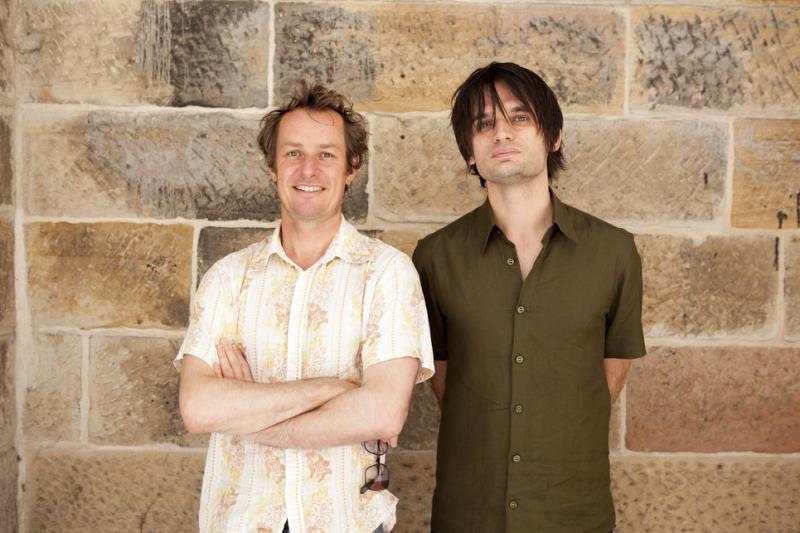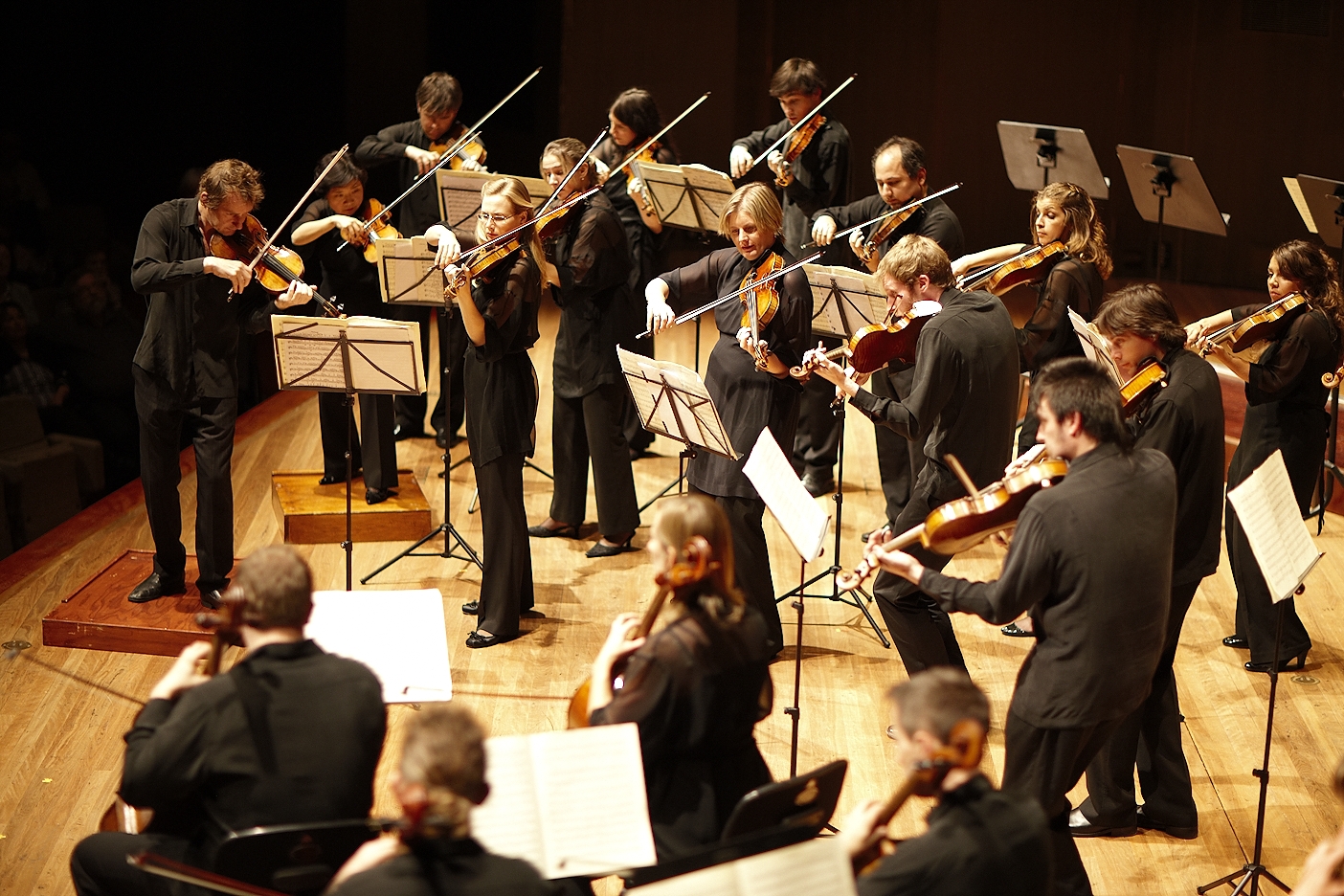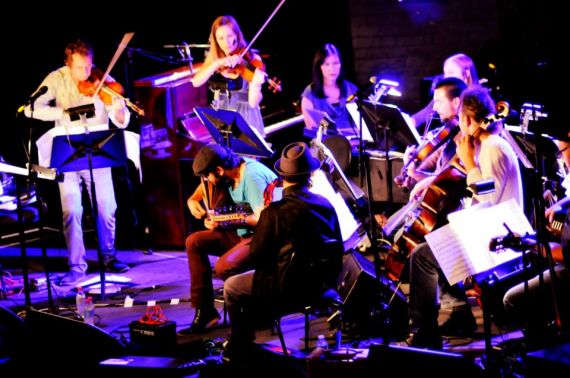'For classical musicians, Radiohead are the band' | reviews, news & interviews
'For classical musicians, Radiohead are the band'
'For classical musicians, Radiohead are the band'
Richard Tognetti of the Australian Chamber Orchestra on premiering a new work by Jonny Greenwood

The first time I interviewed Richard Tognetti he told me a story. Prior to touring the Australian Chamber Orchestra to Japan, the group’s leader and artistic director was discussing publicity with a local PR. Faced with disappointing ticket sales he asked for advice. The response? Remove two letters from the orchestra’s name and transform it into the Austrian Chamber Orchestra – problem solved.
I had cause to remember the anecdote last week, when I found myself in Amsterdam’s glorious neoclassical Concertgebow for one of their regular Sunday morning concerts. Hearing the ACO performing Haydn and Mozart in this nerve centre of classical music, driving the cultural great and good to their feet after a performance of singular energy and wit, felt a lot like a vindication for this superb ensemble. What felt even better though, was sitting upstairs in the bar afterwards with Tognetti, discussing not cadenzas or sonata form, but Nirvana and the Violent Femmes, Metallica and Aphex Twin.
At a rock gig you’d never get someone saying, ‘And this next song is written in G major’The centrepiece of the ACO’s current European tour is a brand new commission by Radiohead’s Jonny Greenwood – Water – that will be premiered in Dublin on 2 October, before coming to London and then on to Australia. I say “Radiohead’s Jonny Greenwood”, but these days the cult indie band’s lead guitarist is just as likely to be found composing classical works for the BBC Concert Orchestra (for whom he is composer is residence), or film scores like There Will Be Blood, The Master and Norwegian Wood, as he is programming advanced electronic software for the band.
“Jonny was finishing up a tour in Australia in 2012,” explains Tognetti, “and wanted to stay on, so he joined us for a three-month residency. We did what you do after hours, took him to some interesting places, but during the day he composed. We gave him the opportunity to have workshops with us so that he could hear the music. That’s what a lot of composers lack – the opportunity to hear the music played and to realise, ‘Oh shit, that’s nothing like what I intended’.”
 The result was Water, a 15-minute piece the composer originally wanted to draw on his love of Australia’s own Clive James and Barry Humphries, but which quickly evolved after Greenwood encountered the tambura – a multi-stringed Asian instrument with a distinctive droning sound. “Even before he got off the plane he was going on about these tamburas and how we had to get hold of some,” says Tognetti. “There was a bit of a Spinal Tap moment at an early workshop session when, after all his romanticising about these huge, wonderful instruments, this tiny little one appeared. It did the job, and later we actually used an iPhone app as another substitute, but for performances we’ll have the real deal."
The result was Water, a 15-minute piece the composer originally wanted to draw on his love of Australia’s own Clive James and Barry Humphries, but which quickly evolved after Greenwood encountered the tambura – a multi-stringed Asian instrument with a distinctive droning sound. “Even before he got off the plane he was going on about these tamburas and how we had to get hold of some,” says Tognetti. “There was a bit of a Spinal Tap moment at an early workshop session when, after all his romanticising about these huge, wonderful instruments, this tiny little one appeared. It did the job, and later we actually used an iPhone app as another substitute, but for performances we’ll have the real deal."
The tambura is at the heart of Water’s exotic musical textures. “The soundworld of the piece is uncannily like certain elements of Jonny’s night-job, but he also admits rich influences from the likes of Penderecki and Messiaen,” explains Tognetti. “He went to hear Messiaen’s Vingt Regards performed by Steven Osborne while he was with us, and said it was one of the best things he’d ever seen. You can hear this same mesmerising soundworld in Jonny’s own music, the same modal harmonies and rising-falling shapes.
“The piece isn’t in Sonata Form or anything, but structurally it’s pretty clear. It goes through this hypnotic opening phase and then simplifies itself, before going back into hypnosis. These sections are very thickly, richly textured – not very melodic, but with these strong intervals creating a sort of melodic inference. Then there’s a very strong rhythmic section where he’s asking us to do all sorts of difficult things, and his famous plucked effect, which Steve Reich described as ‘the first fresh approach to pizzicato since Bartók’. It finishes with a shudder and a bang.”
 But Greenwood didn’t abandon his pop roots altogether during his time in Sydney. Audience members at a gig for Tognetti’s group-within-a-group ACO Underground (pictured left) got a surprise when Greenwood turned up one night to perform Steve Reich’s Electric Counterpoint with the band. “We’re a pretty elite group,” explains Tognetti. “We’ve got the lead guitar and songwriter from Midnight Oil and Brian Ritchie from the Violent Femmes. We like to mix up the venues we play, and this one was a properly dirty nightclub – Le Poisson Rouge is upmarket by comparison. Jonny loved the atmosphere, and we played a bunch of his stuff as well as some Shostakovich, Paganinni and a Kurt Cobain song.”
But Greenwood didn’t abandon his pop roots altogether during his time in Sydney. Audience members at a gig for Tognetti’s group-within-a-group ACO Underground (pictured left) got a surprise when Greenwood turned up one night to perform Steve Reich’s Electric Counterpoint with the band. “We’re a pretty elite group,” explains Tognetti. “We’ve got the lead guitar and songwriter from Midnight Oil and Brian Ritchie from the Violent Femmes. We like to mix up the venues we play, and this one was a properly dirty nightclub – Le Poisson Rouge is upmarket by comparison. Jonny loved the atmosphere, and we played a bunch of his stuff as well as some Shostakovich, Paganinni and a Kurt Cobain song.”
How did it go down with the crowd? “Pretty well. It’s all about context. We try not to talk too much – at a rock gig you’d never get someone saying, ‘And this next song is written in G major’. We just let the music speak for itself.”
Tognetti’s admiration for Greenwood is clear. “For classical musicians Radiohead are the band. They are the most interesting because of their harmonic structures and strangeness, and the fact that they mix different structures and forms together.” But he’s cautious when asked about a broader trend of fusion between pop and classical worlds.
“There are just so many different kinds of pop music these days. Is Jonny playing guitar on stage really connected to Kylie Minogue? There’s a shared DNA of African beats which Stockhausen criticised Aphex Twin’s Richard James for – that’s a commonality, but I’m not sure it’s a desirable one. Without those beats people seem to lose consciousness, it’s like they don’t have a heartbeat. You’ve got to remember that most people in the Western world have just grown up with three-minute pop songs. They might struggle with something like Jonny’s new piece a bit, but that’s fine. Struggle is good.
“What I think is so fantastic about Water is that Jonny isn’t bringing his rock 'n' roll sensibility to classical music. He’s really into Messiaen, and is writing music in that language. Of course there are some funky rhythms, but they’re not cool. This is not cool music at all – aren’t we sick of being cool? To quote David Bowie, we’re all at risk of being ‘so cool we’re cold’.”
- Richard Tognetti and the ACO will premiere Jonny Greenwood's Water at Dublin's National Concert Hall on 2 October 2014, and will perform it at London's Southbank Centre on 4 October.
Buy
Share this article
The future of Arts Journalism
You can stop theartsdesk.com closing!
We urgently need financing to survive. Our fundraising drive has thus far raised £49,000 but we need to reach £100,000 or we will be forced to close. Please contribute here: https://gofund.me/c3f6033d
And if you can forward this information to anyone who might assist, we’d be grateful.

Subscribe to theartsdesk.com
Thank you for continuing to read our work on theartsdesk.com. For unlimited access to every article in its entirety, including our archive of more than 15,000 pieces, we're asking for £5 per month or £40 per year. We feel it's a very good deal, and hope you do too.
To take a subscription now simply click here.
And if you're looking for that extra gift for a friend or family member, why not treat them to a theartsdesk.com gift subscription?
more Classical music
 Solomon, OAE, Butt, QEH review - daft Biblical whitewashing with great choruses
Even a top soprano and mezzo can’t make this Handel paean wholly convincing
Solomon, OAE, Butt, QEH review - daft Biblical whitewashing with great choruses
Even a top soprano and mezzo can’t make this Handel paean wholly convincing
 Two-Piano Gala, Kings Place review - shining constellations
London Piano Festival curators and illustrious friends entertain and enlighten
Two-Piano Gala, Kings Place review - shining constellations
London Piano Festival curators and illustrious friends entertain and enlighten
 Echo Vocal Ensemble, Latto, Union Chapel review - eclectic choral programme garlanded with dance
Beautiful singing at the heart of an imaginative and stylistically varied concert
Echo Vocal Ensemble, Latto, Union Chapel review - eclectic choral programme garlanded with dance
Beautiful singing at the heart of an imaginative and stylistically varied concert
 Scott, Irish Baroque Orchestra, Whelan, RIAM, Dublin review - towards a Mozart masterpiece
Characteristic joy and enlightenment from this team, but a valveless horn brings problems
Scott, Irish Baroque Orchestra, Whelan, RIAM, Dublin review - towards a Mozart masterpiece
Characteristic joy and enlightenment from this team, but a valveless horn brings problems
 Classical CDs: Voice flutes, flugelhorns and froth
Baroque sonatas, English orchestral music and an emotionally-charged vocal recital
Classical CDs: Voice flutes, flugelhorns and froth
Baroque sonatas, English orchestral music and an emotionally-charged vocal recital
 Kanneh-Mason, Britten Sinfonia, Shave, Milton Court - a grin and a big beaming smile
A pair of striking contemporary pieces alongside two old favourites
Kanneh-Mason, Britten Sinfonia, Shave, Milton Court - a grin and a big beaming smile
A pair of striking contemporary pieces alongside two old favourites
 theartsdesk at the New Ross Piano Festival - Finghin Collins’ musical rainbow
From revelatory Bach played with astounding maturity by a 22 year old to four-hand jazz
theartsdesk at the New Ross Piano Festival - Finghin Collins’ musical rainbow
From revelatory Bach played with astounding maturity by a 22 year old to four-hand jazz
 First Person: Manchester Camerata's Head of Artistic Planning Clara Marshall Cawley on questioning the status quo
Five days of free events with all sorts of audiences around Manchester starts tomorrow
First Person: Manchester Camerata's Head of Artistic Planning Clara Marshall Cawley on questioning the status quo
Five days of free events with all sorts of audiences around Manchester starts tomorrow
 Goldscheider, Brother Tree Sound, Kings Place review - music of hope from a young composer
Unusual combination of horn, strings and electronics makes for some intriguing listening
Goldscheider, Brother Tree Sound, Kings Place review - music of hope from a young composer
Unusual combination of horn, strings and electronics makes for some intriguing listening
 theartsdesk Q&A: composer Donghoon Shin on his new concerto for pianist Seong-Jin Cho
Classical music makes its debut at London's K-Music Festival
theartsdesk Q&A: composer Donghoon Shin on his new concerto for pianist Seong-Jin Cho
Classical music makes its debut at London's K-Music Festival

Add comment